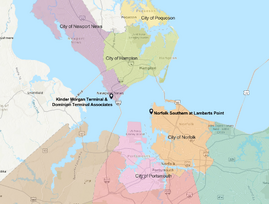Norfolk City Council: Difference between revisions
No edit summary |
No edit summary |
||
| Line 1: | Line 1: | ||
''To read more about local regulations around coal dust, see [[Local Regulations]].'' | ''To read more about local regulations around coal dust, see [[Local Regulations]].''[[File:Hampton Roads Jurisdiction.png|thumb|Map showing the local jurisdictions the Hampton Roads region, with the City of Norfolk in orange and the three coal terminals marked.|269x269px]]''To read about Newport News City Council, see [[Newport News City Council]]'' | ||
Norfolk City Council is the legislative and policy-making body for the city of Norfolk and is the final authority on City matters. Like all Virginia cities, Norfolk operates under Dillon’s Rule, meaning it only has powers explicitly granted by the [https://voicesinthedust.org/State_Legislature_and_General_Assembly Virginia General Assembly]. It cannot enact laws that conflict with state or federal statutes and has no authority over environmental permitting, which is handled by the [https://voicesinthedust.org/Virginia_Department_of_Environmental_Quality_(VA_DEQ) Virginia Department of Environmental Quality] (DEQ) and the federal [https://voicesinthedust.org/U.S._Environmental_Protection_Agency_(EPA) Environmental Protection Agency] (EPA). Enforcement power is limited to local tools like fines, stop-work orders, or zoning actions. The Council also cannot create criminal penalties or impose conditions outside the scope of municipal code. Political and budgetary constraints can limit how aggressively ordinances are pursued or enforced. | |||
== Relevance == | == Relevance == | ||
While the jurisdiction of Norfolk City includes [[Coal Terminals in the Port of Virginia|Pier 6, the Norfolk Southern terminal at Lamberts Point]], Norfolk does not have contracts with or permitting jurisdiction over the terminals and shipyard of the Port of Virginia. Therefore, the City Council has less immediate decision making authority in addressing the coal dust pollution in the area, and activism efforts have focused elsewhere ( | While the jurisdiction of Norfolk City includes [[Coal Terminals in the Port of Virginia|Pier 6, the Norfolk Southern terminal at Lamberts Point]], Norfolk does not have contracts with or permitting jurisdiction over the terminals and shipyard of the Port of Virginia. Therefore, the City Council has less immediate decision making authority in addressing the coal dust pollution in the area, and activism efforts have focused elsewhere (locally, the [[Newport News City Council]]).<ref>citation needed</ref> | ||
Revision as of 02:57, 16 July 2025
To read more about local regulations around coal dust, see Local Regulations.

To read about Newport News City Council, see Newport News City Council
Norfolk City Council is the legislative and policy-making body for the city of Norfolk and is the final authority on City matters. Like all Virginia cities, Norfolk operates under Dillon’s Rule, meaning it only has powers explicitly granted by the Virginia General Assembly. It cannot enact laws that conflict with state or federal statutes and has no authority over environmental permitting, which is handled by the Virginia Department of Environmental Quality (DEQ) and the federal Environmental Protection Agency (EPA). Enforcement power is limited to local tools like fines, stop-work orders, or zoning actions. The Council also cannot create criminal penalties or impose conditions outside the scope of municipal code. Political and budgetary constraints can limit how aggressively ordinances are pursued or enforced.
Relevance
While the jurisdiction of Norfolk City includes Pier 6, the Norfolk Southern terminal at Lamberts Point, Norfolk does not have contracts with or permitting jurisdiction over the terminals and shipyard of the Port of Virginia. Therefore, the City Council has less immediate decision making authority in addressing the coal dust pollution in the area, and activism efforts have focused elsewhere (locally, the Newport News City Council).[1]
- ↑ citation needed